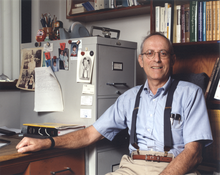|
Irwin Fridovich
 Irwin Fridovich (August 2, 1929 – November 2, 2019)[1] was an American biochemist who, together with his graduate student Joe M. McCord, discovered the enzymatic activity of copper-zinc superoxide dismutase (SOD),[2][3]—to protect organisms from the toxic effects of superoxide free radicals formed as a byproduct of normal oxygen metabolism.[4] Subsequently, Fridovich's research group also discovered the manganese-containing[5] and the iron-containing[6] SODs from Escherichia coli and the mitochondrial MnSOD (SOD2),[7] now known to be an essential protein in mammals.[8] He spent the rest of his career studying the biochemical mechanisms of SOD and of biological superoxide toxicity, using bacteria as model systems.[9][10][11] Fridovich was also Professor Emeritus of Biochemistry at Duke University. Academic careerFrom 1951 to 1952, Fridovich served as a medical research associate at Cornell Medical College. He held junior teaching positions in biochemistry at Duke University 1956 to 1961 and was a visiting research associate at Harvard University from 1961 to 1962. He became an assistant professor in biochemistry at Duke University in 1961 and a full professor in 1971. He was appointed as James B. Duke Professor of Biochemistry in 1976 and held the position as professor emeritus since 1996 until his death. Awards and honorsFridovich received numerous awards and recognitions for his work, including membership in the National Academy of Sciences and the American Academy of Arts and Sciences, and the Elliott Cresson Medal of the Franklin Institute, Philadelphia. According to Google Scholar, he has over 51,000 citations in the scientific literature, including 7 papers with >1000 citations, and an h-index of 97.[12] His discovery of the superoxide dismutase reaction essentially started the field of oxygen free radicals in biology and medicine,[11][13] and that influence is shown by his election as president of the American Society of Biological Chemists (for 1982–83)[1] Archived 2012-06-04 at the Wayback Machine, the Oxygen Society (1987–1990), and the Society for Free Radical Research (1992–94), as well as award of the Science & Humanity Prize at the 2000 Oxygen Club World Congress. References
|
||||||||||||||||||||||||
Portal di Ensiklopedia Dunia
